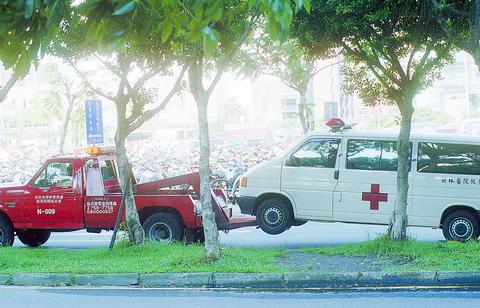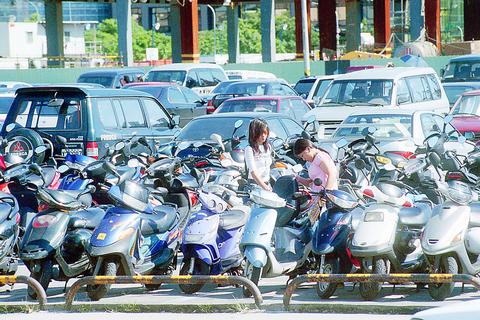City councilors and the owners of private parking areas are giving the Taipei City Government's new scheme for assessing parking fees mixed reviews.
The new scheme began on Aug. 15 and includes three different initiatives: raising parking fees at certain roadside spaces, restricting some major roads to short-term parking, and experimenting with a program of increasing the fee for each hour parked.
At the city's 20,184 public parking spaces, which are spread out over seven of the city's 12 districts, prices for parking have been raised by 50 percent and now stand at between NT$30 and NT$50 per hour.

PHOTO: GEORGE TSORNG, TAIPEI TIMESN
The city has also created a "short-term parking" measure, in which drivers traveling on the 11 major roads during the workweek from 8am to 8pm can take advantage of spaces set up near banks, post offices and other government offices.
The cost is NT$5 for every 15 minutes and the maximum time allowed is one hour. Violators found not paying or not paying enough will receive a ticket instead of being allowed to make up the shortfall.
The city is also trying out a program of increasing hourly charges based on time at the underground parking lot at the Chungshan Hall (中山堂) during peak hours between 8am and 8pm.

PHOTO: GEORGE TSORNG, TAIPEI TIMES
While the fee is NT$30 for the first hour, this amount goes up to NT$40 per hour for parking over one hour and less than five hours. The fee is NT$50 per hour for between five and 10 hours, and NT$60 per hour for between 10 and 12 hours.
Although the city's efforts are well intended, the fact is that the parking spaces available in the city are too few for a city of 2.6 million people and 650,000 cars.
According to the latest data released by the city's Bureau of Transportation (
Roadside parking spaces accounted for about 29,000, or eight percent of the total; and above-ground and underground parking spaces took up about 31,000, or 9 percent of the total.
In other words, in Taipei, one in four individuals owns a car, and the car to parking spot ratio is roughly 2:1.
Another form of taxation
Although the city has claimed that these measures are meant to ease the city's parking problems, city councilors are not impressed with the city's efforts.
New Party City Councilor Lee Ching-yuan (
"The money collected from these new programs may be as high as NT$1 billion a year. If it's not just another tax scheme by the city, I don't know what it is," he said.
It is an "unacceptable excuse" to raise parking fees in order to encourage the construction of more private parking lots, Lee said.
"It's obvious that the city does this to profit from the private parking industry," he said. "Besides, it's not practical to build more private parking lots, because it sabotages the quality of life in the community where the lots are built. Moreover, the facilities are not used very often because of their high fees," he said, adding that parking fees at private parking facilities can cost twice or three times as much as at public parking lots.
DPP City Councilor Lee Chien-chang (
"It's suspicious that the city has decided to implement the measures when the City Council is in recess, although the measures do not need the City Council's approval before they go into effect," he said.
Lee Chien-chang said that although he favors an eventual price hike, it has to be done under one premise.
"That is, the network of the mass rapid transit system has to be complete and further integrated with other mass transportation systems," he said, noting that the entire system may take at least five to six years to take shape.
When the comprehensive mass transportation system is complete, Lee Chien-chang said, then it will be the right time to discuss the issue of price hikes for parking.
"It's simply unfair to ask the public to pay more when the city is not capable of providing the public with enough parking spaces in the first place," he said.
KMT City Councilor Wang Hao (
"Roadside parking simply doesn't make sense because roads are made for cars, not for parking," he said. "The streets are already too narrow for cars, motor scooters, and pedestrians to maneuver, let alone setting aside spaces for parking."
Wang proposed that the city use the funds collected from parking to immediately start building more above-ground and underground parking lots.
"Building more public parking lots does not necessarily mean that it will encourage the increase of vehicles on the road if a comprehensive network of public transportation is available," he said.
The latest data released by the city's Bureau of Transportation seems to support Wang's theory. Figures show that since the Hsintien MRT line became operational last November and the Panchiao-Nankang line one month later, the total number of motor vehicles in Taipei has been decreasing.
Last November, there were 668,000 automobiles in the city. By December, the number had fallen to 650,000. The number fell further to about 630,000 in June this year.
New Party City Councilor Chin Li-fang (
"You simply cannot solve the city's transportation problem by increasing the parking fees for 20,000-odd parking spaces," she said. "Besides, the measures are too complicated to remember. Who knows what measure applies to which parking lot?"
To solve the city's parking problem, Chin said, it is key to halt the increase in the number of motor vehicles and to limit their entrance into the city.
Since city residents are already overwhelmed by high living expenses and taxes, Chin proposed that Taipei County could shoulder more of the financial burden, especially after the central government recently rejected the city's efforts to secure the retention of the 47 percent quota of tax redistribution reserved for Taipei and Kaohsiung.
"If the city wants to offset the NT$4.2 billion deduction from the tax redistribution fund, it should go to Taipei County because it owes the city a great deal of money," she said.
Good news for owners of parking lots
Despite the opposition from city councilors, the city's new initiative to increasing parking fees seems to be receiving support from the industry.
Chang Cheng-tsung (
"Once the roadside parking fees go up or reach the level of those at private parking facilities, more people will use private parking because it makes more sense to park in a covered and guarded facility if you are paying the same as outdoor parking," he said.
According to Chang, the industry has been suffering since 1997 when the government temporarily halted a 1991 initiative to encourage the building of private parking facilities.
"The incentive program allowed us to build 40 parking spaces on a 40-ping lot, but now with the law suspended, we don't have any incentive to build more parking lots. The only related law governing the construction of parking lots is the Construction Law, which allows us to build about 20 parking spaces on a 40-ping lot," he said.
According to Chang, a parking space at a parking tower may cost about NT$400,000 to build and an underground parking space may cost about NT$80,000 to build.
Things may be looking up, however, Chang said, because the Ministry of Transportation and Communications is slated to hold a meeting on Aug. 31 to review the 1997 suspension.
Whether or not the private parking initiative is revived, Chang argues that parking towers are the best solution to the city's parking problem.
"They're constructed in a very safe and efficient way," he said.
Chang said that he has been bewildered by the public's stance about private parking facilities.
"I don't know what people out there are thinking about. On the one hand, they want to have more parking spaces, but on the other hand, they don't want to see the parking towers built in their neighborhood," he said.

SECURITY: As China is ‘reshaping’ Hong Kong’s population, Taiwan must raise the eligibility threshold for applications from Hong Kongers, Chiu Chui-cheng said When Hong Kong and Macau citizens apply for residency in Taiwan, it would be under a new category that includes a “national security observation period,” Mainland Affairs Council (MAC) Minister Chiu Chui-cheng (邱垂正) said yesterday. President William Lai (賴清德) on March 13 announced 17 strategies to counter China’s aggression toward Taiwan, including incorporating national security considerations into the review process for residency applications from Hong Kong and Macau citizens. The situation in Hong Kong is constantly changing, Chiu said to media yesterday on the sidelines of the Taipei Technology Run hosted by the Taipei Neihu Technology Park Development Association. With

CARROT AND STICK: While unrelenting in its military threats, China attracted nearly 40,000 Taiwanese to over 400 business events last year Nearly 40,000 Taiwanese last year joined industry events in China, such as conferences and trade fairs, supported by the Chinese government, a study showed yesterday, as Beijing ramps up a charm offensive toward Taipei alongside military pressure. China has long taken a carrot-and-stick approach to Taiwan, threatening it with the prospect of military action while reaching out to those it believes are amenable to Beijing’s point of view. Taiwanese security officials are wary of what they see as Beijing’s influence campaigns to sway public opinion after Taipei and Beijing gradually resumed travel links halted by the COVID-19 pandemic, but the scale of

A US Marine Corps regiment equipped with Naval Strike Missiles (NSM) is set to participate in the upcoming Balikatan 25 exercise in the Luzon Strait, marking the system’s first-ever deployment in the Philippines. US and Philippine officials have separately confirmed that the Navy Marine Expeditionary Ship Interdiction System (NMESIS) — the mobile launch platform for the Naval Strike Missile — would take part in the joint exercise. The missiles are being deployed to “a strategic first island chain chokepoint” in the waters between Taiwan proper and the Philippines, US-based Naval News reported. “The Luzon Strait and Bashi Channel represent a critical access

Pope Francis is be laid to rest on Saturday after lying in state for three days in St Peter’s Basilica, where the faithful are expected to flock to pay their respects to history’s first Latin American pontiff. The cardinals met yesterday in the Vatican’s synod hall to chart the next steps before a conclave begins to choose Francis’ successor, as condolences poured in from around the world. According to current norms, the conclave must begin between May 5 and 10. The cardinals set the funeral for Saturday at 10am in St Peter’s Square, to be celebrated by the dean of the College